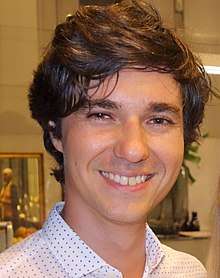Luka Mesec
Luka Mesec (born 1 July 1987) is a Slovenian politician and activist who has been the leader of the eco-socialist The Left party since June 2017.[1] Mesec was elected to the Slovenian National Assembly for the first time at the 2014 parliamentary election, and reelected at the 2018 parliamentary election. He is the coordinator of the Council of the Initiative for Democratic Socialism, Labour-punk University and its successor, the Institute for Labour Studies.[2]
Luka Mesec | |
|---|---|
 | |
| Member of the National Assembly for Trbovlje Electoral District | |
| In office 1 August 2014 – 22 June 2018 | |
| Member of the National Assembly for Ljubljana-Bežigrad 2nd Electoral District | |
| Assumed office 22 June 2018 | |
| Personal details | |
| Born | 1 July 1987 Kranj, SR Slovenia, Yu |
| Political party | The Left |
| Alma mater | University of Ljubljana |
Early life and education
Luka Mesec was born on 1 July 1987 in Kranj. He grew up in Železniki where he finished elementary and high school after which he enrolled in the political science studies at the Faculty of Social Sciences of the University of Ljubljana. In 2012, he graduated in European studies.[3] During studies, Mesec was active in the Club of Students of the Selška valley, Student Politological Society Polituss, Mi smo univerza movement, and Prekercev front. Since 2010, he has actively participated in the work of the Labour-punk university, an activist-theoretical organization which brought democratic socialism to Slovenian politics and the Institute for Labor Studies.[1]
Political career
Mesec participated in the 2012–13 Slovenian protests. He was elected to the Slovenian National Assembly at the 2014 parliamentary election, and reelected in 2018. Under his leadership, The Left party connected with member parties of the Party of the European Left, including Greek Syriza, French Left Front, German The Left and Spanish United Left.
Political positions
Mesec advocates participatory economics, social corporate governance, tax relief for the poor, labor rights and the abolition of tax havens, and is against neoliberalism, which, in his opinion, is nothing more than a class struggle of capital against organized labor. He believes that Europe, which once had a strong social democracy and trade unions, is experiencing this class struggle under the guise of European integration, in which countries compete against each other instead of being based on reciprocity.[4]